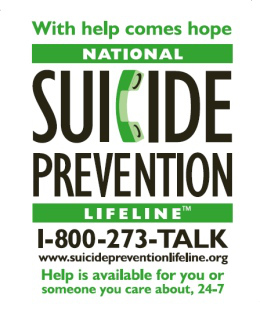Suicide Safer Communities
Suicide- even the mention of the topic can make people uncomfortable. We tend to shy away or have adverse reactions to hearing, talking or thinking about it. That raises the question then, “How do we help others if we ourselves cannot see beyond our own insecurity/uncertainty for handling suicide?” One may experience conflicting feelings when considering acceptance or avoidance. Suicide may feel like a taboo subject or a personal conflict based on one’s values. However, suicide is real, it exists, and it affects more people than one would assume. Having the confidence and knowledge to handle a situation involving suicide may be crucial to making a difference in someone’s life. So how do we rationalize or normalize suicide so that we as a community are more equipped to deal with it?
One factor that may keep the risk of suicide private is the fact that it is typically looked down upon. Someone that mentions they are considering taking their own life often lose control after admission. Those they confide in can have, understandably, extreme reactions. These reactions may include anger, denial, guilt, sadness, etc. While it is normal to experience these emotions after someone admits their suicidal thoughts and potential actions, it is important to focus on the one who is considering suicide first. Focus on your own emotions separately from the current conversation; let the one in need be your focus. Let them know that you are there to talk, that you want to help, and that you could understand why they see this as their only option. If you “freak out” it may cause them to shut down and continue to contemplate in silence.
When one is bogged down with chronic mental illness, it may appear impossible for them to ever see things getting better. They may be so wrapped up in their own mind and despair that they cannot see past their suffering and think rationally. When one is clouded with doubt and anguish, they may have what is known as tunnel vision- or the inability to see options other than their own point of view. It is important to listen and get help. There are many ways to get help. Some include telling someone in an authoritative or supportive position (teacher, boss, parent, spouse, etc.), contacting a suicide prevention hotline for information or coaching, and suggesting a hospital visit so that they can get checked out and evaluated. Make sure that those considering suicide understand that you are coming from a place of caring, concern, and absolute support to get them help. They may respond defensively but it needs to be realized that they are defensive because they are trying to protect themselves. This defensiveness may stem from anger, sadness, embarrassment or shame.
Other common behaviors of someone contemplating suicide may include a brightening in their attitude, explaining that they are feeling better or found relief, and giving away possession. When one seems to be getting better and presenting as happier, it may be that they feel they have found a solution to their problems. After suffering and not knowing how to escape, they have made the decision to end their life, thus lessening their burden. This also ties into a person seeming like they have found relief. If they have contemplated in the past, but have decided on suicide now, they may feel that their time is limited and there is an end in sight to their suffering. Knowing that it will “all be over soon” may increase their mood and outlook. Giving away possessions or tying up loose ends can also be a sign that one has made a decision to take their life. They may start to organize important documents, give away objects with sentimental value, and make finalizing grand gestures—such as a goodbye. It is important to watch out for these signs if you are concerned one may be contemplating suicide.
It is crucial that one remains unbiased during these situations. That they approach their options with caution and do not come off as judgmental. Using an even tone, an understanding or accepting expression, and body language that signals you are open and willing to talk can make opening up much easier. Our reactions to finding out that someone is considering suicide should remain neutral and caring. Be an active listener and not reactive. Let your loved one, co-worker, peer, or even a stranger, feel as if they can open up without judgement and that you are there to comfort and listen. You do not need to take immediate action as it may alarm those expressing suicidal thoughts and could cause them to shut down. Try to get all the important and relevant information before intervening. As mentioned before, reach out in times of need, contact a hotline for information or coaching, and reach out to emergency medical services if necessary. Try not to leave a suicidal person alone and make sure they have a safety plan for being monitored and reaching out for help in case thoughts or emotions take over again.
Self-care is ideal after such encounters. Make sure to take the time to calm down and evaluate your state of mind. Conversations about suicide can be difficult and leave one feeling uneasy. After an encounter with a suicidal person, one may be left with thoughts of doubt or feeling as if they did not do enough. What is most important is to remember that a suicidal person may need to get it off their chest that they are having these thoughts. Talking about it and making it known to someone can be a great relief. If you feel that emergency intervention is needed, then do not hesitate to call 911. It is always better to be safe. Do not hesitate to reach out to your own support systems, or a suicide prevention hotline. A hotline is a great anonymous way to talk through what you encountered. It gives a different perspective on the situation from an outside source that is trained to handle such situations. By reducing the stigma around suicide and normalizing our reactions to its potential, we are headed towards a suicide safer community.
Resources:
DuPage County Crisis Intervention Unit: 630-627-1700
National Suicide Prevention Lifeline: 800-273-8255
How to Develop a Safety Plan: www.suicidesafetyplan.com
By: Shannon Aeschliman


